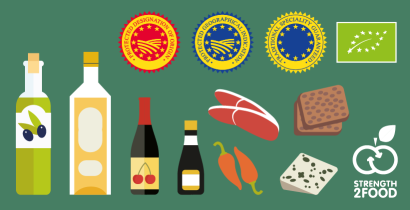Quality labels: What are EU food quality schemes?
Last Updated : 27 May 2021Quality is an important consideration for consumers when purchasing food. It is equally important for producers while negotiating the price of their products. As a result, the European Commission protects food products with distinctive quality characteristics through food quality schemes.
Food quality
Consumers used to consider food to be of good quality when it did not have any defects and was not adulterated.1 However, in recent years, the concept of food quality has changed. Today, we think of food to be of good quality when it has certain desirable attributes. These attributes can be extrinsic as well as intrinsic. The intrinsic attributes of a food product are those that we can assess using our senses.2 Colour, appearance, flavour, and smell are examples of intrinsic attributes. Extrinsic attributes are those that are not tangible but are still a part of the food product, for example, environmental impact, place of origin and traditional know-how in their manufacture.2
EU food quality schemes
European consumers value certain food products because of their special qualities, both intrinsic and extrinsic. To help differentiate such products, the European Commission protects them through food quality schemes. The Commission lays down certain rules about which foods qualify to be protected, what producers must do to have their products recognised, and how their distinctive quality can be communicated to consumers. European and non-European producers who wish for their products to be protected by a quality scheme can send an application to their country’s national authority, which is then forwarded to the European Commission who check the application to see if the product qualifies. For all quality schemes, each EU country’s competent national authorities are responsible for preventing and stopping the misuse of products using such a name.
Types of quality schemes
There are currently four EU food quality schemes. Next to these, there are national and regional quality labels that are applicable in the various Member States. Products protected by quality schemes, national or EU-wide, can be identified by the logos of the respective schemes on their packaging.
Geographical indications
A geographical indication is a way to mark products that have certain qualities or a good reputation due to their geographical origin and traditional know-how.3 Within the EU, two food quality schemes deal with geographical indications.
Protected designation of origin (PDO)
For a food product to be considered a PDO product, the production, processing, and preparation must take place in a specific geographical area.4 This also includes the raw material used in its production, which also needs to come from within that area. 4 Traditional knowledge of the people from the region plays an important role as well.4
An example of a PDO product is ‘Brabantse Wal asperges’ which is a variety of white asparagus from the Brabant region of the Netherlands. The salty groundwater, the sandy soil, and the knowledge of the local farmers make the asparagus special.5 The geography of the Brabant region plays an important role in shaping the attributes of the product as well.5
Protected geographical indication (PGI)
PGI designation is less restrictive. At least one of the stages of production, processing, or preparation must take place in a specific geographical area.4 The raw material used in production can come from another region.4 An example of a PGI product is Düsseldorfer Mostert – a ready-to-use mustard paste from the city of Düsseldorf in Germany. It is prepared by mixing brown and yellow mustard seeds with the lime and mineral rich water of Düsseldorf and unfiltered spirit vinegar produced in Düsseldorf.6 The vinegar, water, and production technique link the product to Düsseldorf, but the mustard seeds can be sourced from elsewhere.6
Traditional speciality guaranteed (TSG)
Some traditional food products with special qualities are not linked to one specific region. The traditional speciality guaranteed (TSG) scheme protects such products from falsification and misuse. An example of a TSG product is Jamón serrano. Since the TSG scheme protects it, producers in Europe must follow the traditional production method if they wish to make Jamón serrano.7 There are no restrictions on the region of production or the breed of pig that they can use.7
Food and agricultural products, as well as wine, spirits and aromatized wine, registered under the PDO, PGI, and TSG scheme, can be found on the European Commission’s e-Ambrosia portal.
Organic
Organic foods are those foods that have been certified as grown using organic farming techniques. Organic farming involves the creation of a sustainable agricultural system. It does not use synthetic pesticides or genetically modified organisms.8 Organic farmers strive to maintain biodiversity, use natural resources responsibly, and ensure that farm animals are well looked after.8 Several types of foods like fruits, vegetables, cereals, and meats can be organic. ‘Organic’ is a quality attribute related to the production process. Thus, the organic scheme is a food quality scheme.
The future
Analysis by Strength2Food, a project dedicated to the quality and sustainability of food, was carried out to understand the impacts of food quality schemes on the territory. The findings indicate that producers and rural communities derive many benefits from these schemes such as the creation of new job opportunities, receiving a fair price for high-quality products, and the preservation of cultural practices.9 This is not only true for European countries but also emerging economies like Thailand and Vietnam.9
However, not all of these initiatives have been equally successful, and much potential remains unfulfilled.9 A simpler and speedier registration process and stronger action against fraud and falsification are important so that producers and consumers can benefit from the quality schemes.9 It is also important for consumers to better understand what the schemes represent, how they differ from conventional products, and how their quality and reputation is linked to the production methods and/or a specific territory.9 Currently their impact is limited, as only a minority of EU consumers recognise geographical indication labels like PDO and PGI and even fewer consumers understand what they mean and the differences between them.9 The EU organic label, on the other hand, while being well recognised by consumers, does not inspire a high degree of trust and its products are perceived as too expensive. 9 A major challenge, therefore, is to communicate the benefits of food quality schemes to consumers in an impactful way.
References
- European Commission website. Food quality section. Accessed 18 October 2020
- Espejel J, Fandos C & Flavián C (2007). The role of intrinsic and extrinsic quality attributes on consumer behaviour for traditional food products. Managing Service Quality: An International Journal, 17(6), 681–701
- European Commission website. Geographical indication section. Accessed 16 October 2020.
- Regulation (EU) No 1151/2012 of the European Parliament and of the Council of 21 November 2012 on quality schemes for agricultural products and foodstuffs.
- Document 52015XC1006(02). ‘Brabantse Wal Asperges’. EU No: NL-PDO-0005-01177
- Document 52011XC1104(04). ‘Düsseldorfer Mostert’. DE-PGI-0005-0799-24.02.2010
- Document C1998/371/03. ‘Jamón serrano’. (98/C 371/03).
- Council Regulation (EC) No 834/2007 of 28 June 2007 on organic production and labelling of organic products and repealing Regulation (EEC) No 2092/91.
- STRENGTH2FOOD (Strengthening European food chain sustainability by quality and procurement policy).


